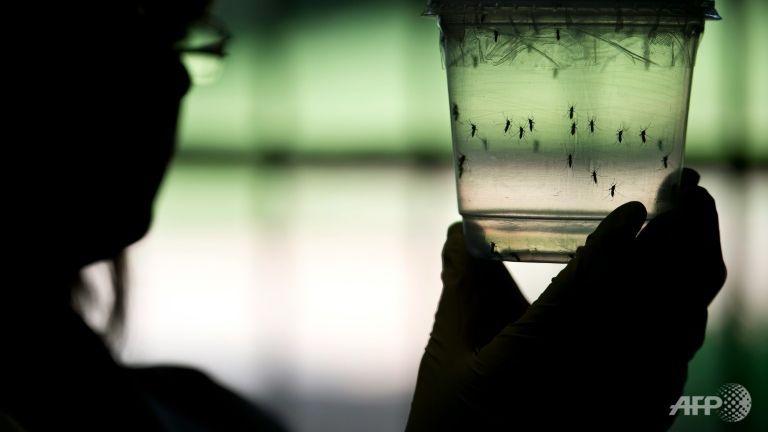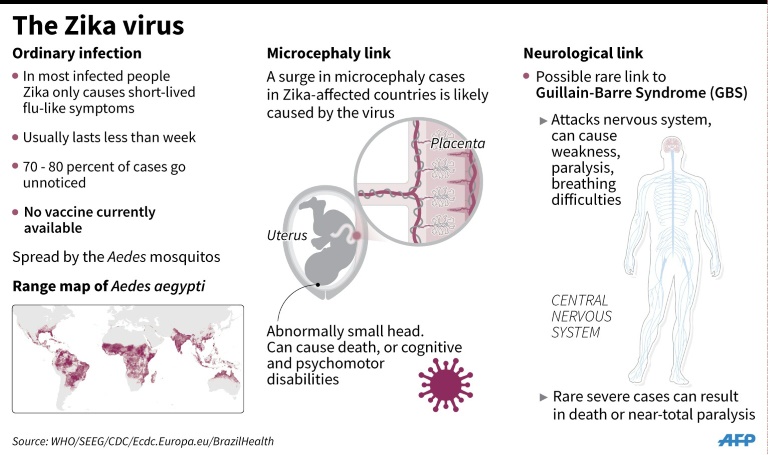Zika virus implicated in brain infection in adults: French study
 |
| The Zika virus, already linked to brain damage in babies, can also cause a serious brain infection in adults. (Photo: AFP/Nelson Almeida) |
PARIS: The Zika virus, already linked to brain damage in babies, can also cause a serious brain infection in an adult victim, French researchers warned Thursday (Mar 10).
Zika virus was found in the spinal fluid of an 81-year-old man who was admitted in January to a hospital near Paris shortly after returning from a month-long cruise.
The man -- semi-comatose, with a high fever and partial paralysis -- was diagnosed with meningoencephalitis, an inflammation of the brain and its membrane, the team wrote in New England Journal of Medicine.
 |
"It is the first case of its kind to be reported, to our knowledge," Guillaume Carteaux, co-author of the paper and specialist at the hospital which treated him, told AFP.
The mere presence of virus does not prove it is what caused the disease.
The patient, who was reported to have been in good health during his cruise around New Caledonia, Vanuato, the Solomon Islands and New Zealand, has since partially recovered.
"Clinicians should be aware that (Zika virus) may be associated with meningoencephalitis," the team wrote.
No other viruses or other infectious agents were found in the man's system, they added.
On Wednesday, a different French team linked the virus sweeping Latin America and the Caribbean to paralysis-causing myelitis.
They reported that a 15-year-old girl diagnosed on the French Caribbean island of Guadeloupe with acute myelitis in January had high levels of Zika in her cerebrospinal fluid, blood and urine.
Myelitis is an inflammation of the spinal cord. It can affect limb movement and cause paralysis by interrupting communication between the spinal cord and the rest of the body.
SPREADING ALARM
The mosquito-borne Zika virus usually causes mild symptoms in adults, with a low fever, headaches and joint pain.
Its quick spread has caused alarm due to an observed association with microcephaly, which deforms the brains of unborn babies, and Guillain-Barre, a rare condition in which the body's immune system attacks a part of the nervous system that controls muscle strength.
Brazil has been hardest hit by the Zika outbreak, with some 1.5 million people infected and 641 confirmed cases of microcephaly in children born to women infected with the virus while pregnant.
According to the World Health Organisation, 41 countries or territories have reported transmission of Zika within their borders since last year, and eight have reported an increase in Guillain-Barre cases.
A rise in microcephaly and other baby malformations has so far "only been reported in Brazil and French Polynesia", according to the WHO. There is no vaccine or treatment for Zika.
What the stars mean:
★ Poor ★ ★ Promising ★★★ Good ★★★★ Very good ★★★★★ Exceptional
Latest News
More News
- Foreign leaders extend congratulations to Party General Secretary To Lam (January 25, 2026 | 10:01)
- Russian President congratulates Vietnamese Party leader during phone talks (January 25, 2026 | 09:58)
- Worldwide congratulations underscore confidence in Vietnam’s 14th Party Congress (January 23, 2026 | 09:02)
- Political parties, organisations, int’l friends send congratulations to 14th National Party Congress (January 22, 2026 | 09:33)
- 14th National Party Congress: Japanese media highlight Vietnam’s growth targets (January 21, 2026 | 09:46)
- 14th National Party Congress: Driving force for Vietnam to continue renewal, innovation, breakthroughs (January 21, 2026 | 09:42)
- Vietnam remains spiritual support for progressive forces: Colombian party leader (January 21, 2026 | 08:00)
- Int'l media provides large coverage of 14th National Party Congress's first working day (January 20, 2026 | 09:09)
- Vietnamese firms win top honours at ASEAN Digital Awards (January 16, 2026 | 16:45)
- ASEAN Digital Ministers' Meeting opens in Hanoi (January 15, 2026 | 15:33)
















 Mobile Version
Mobile Version